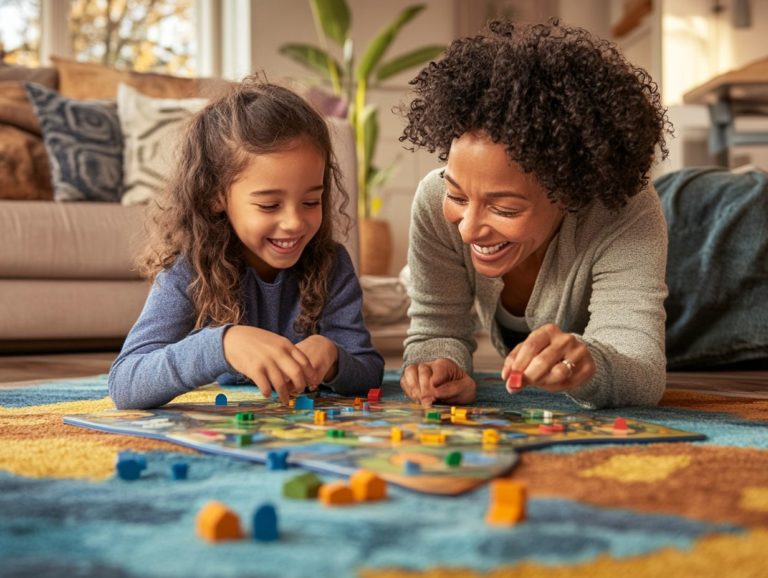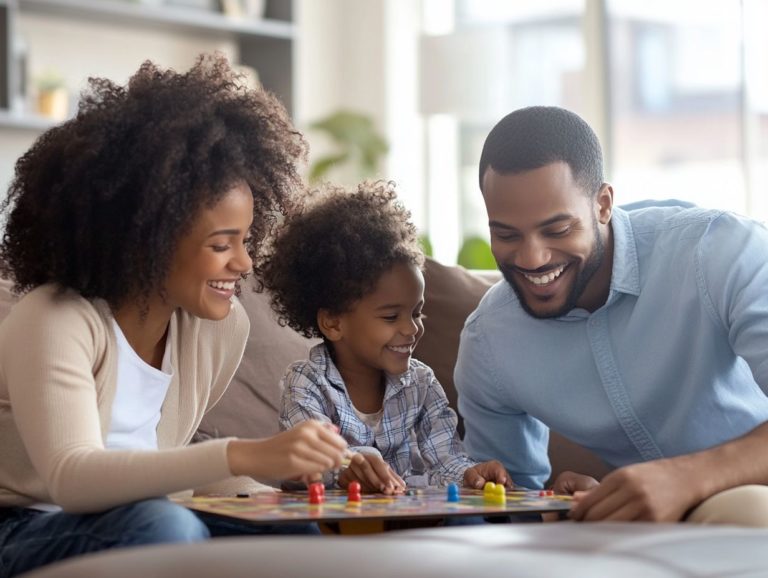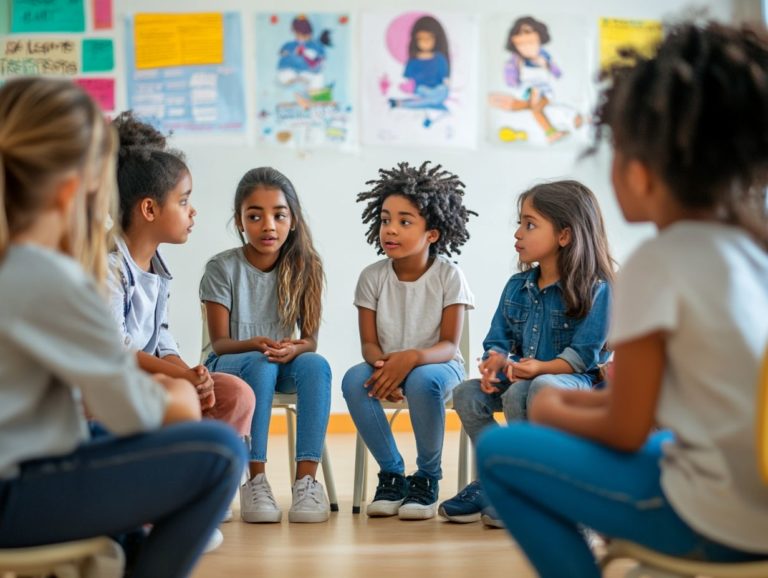The Role of Gratitude in Family Life
Gratitude isn t just a passing sentiment; it s a powerful practice capable of transforming your family dynamics and fortifying your family bonds.
This exploration will unveil the true essence of gratitude, distinguishing it from mere thankfulness, and highlighting its critical role in family life. You ll learn how nurturing connections and fostering happiness can be achieved through the myriad benefits of practicing gratitude as a family, including emotional well-being and psychological health.
You will also uncover practical strategies to cultivate this invaluable mindset within your home, ensuring that gratitude becomes a fundamental aspect of your daily life together.
Contents
Key Takeaways:

- Gratitude strengthens family bonds and promotes positive relationships.
- Leading by example and encouraging thankfulness are key ways to teach gratitude to children.
- Incorporating gratitude into daily family life through rituals, activities, and expressions can have numerous benefits for both parents and children.
The Power of Gratitude
Emotional Healing
The power of gratitude is truly profound, shaping your emotional well-being and serving as a cornerstone for family healing, particularly in the context of substance abuse challenges and mental health struggles.
Research demonstrates that engaging in gratitude practices like keeping a gratitude journal or writing gratitude letters can significantly boost your mental health by nurturing a positive outlook and strengthening family connections.
In contemporary therapy and recovery environments, incorporating gratitude exercises is acknowledged as an essential element of the healing journey. It helps individuals develop effective coping mechanisms for addiction recovery by fostering mindfulness and a deep sense of appreciation. This gratitude practice is pivotal for enhancing emotional well-being and self-worth.
What is Gratitude?
Gratitude is a rich, complex feeling that envelops you in a profound sense of thankfulness and appreciation for the positive elements in your life. It plays a significant role in your emotional well-being and manifests in various forms, from simple acts of kindness to deeper expressions through gratitude journaling and heartfelt letters.
Research in positive psychology reveals that cultivating gratitude can enhance your social well-being and grant you emotional freedom.
This intricate emotion not only helps you connect with others but also encourages you to recognize and savor the good experiences that come your way. Acknowledging these moments can set off a delightful chain reaction of positive feelings and actions, reinforcing your overall optimistic outlook and positive relationships.
By engaging in gratitude exercises, such as maintaining a daily gratitude list or practicing mindfulness, you can tap into your emotions and reframe challenges as opportunities for growth. In doing so, you cultivate resilience, strengthen your relationships, and significantly boost your mental health.
Embracing gratitude becomes an essential practice for anyone eager to enrich their life experience and improve their psychological health! Start practicing gratitude today and watch your family relationships flourish!
Understanding Gratitude and Thankfulness
How is Gratitude Different from Thankfulness?
While you might often use gratitude and thankfulness interchangeably, it’s essential to recognize the distinct characteristics that each embodies. They play important roles in your emotional well-being.
Gratitude typically reflects a deeper, more reflective emotion that embraces a broader scope of appreciation than mere thankfulness. When you experience gratitude, you acknowledge the kindness of others and often feel an innate desire to reciprocate. In contrast, thankfulness is primarily a direct response to a specific act or gift.
Consider this: you might feel thankful for a friend who offers a listening ear after a challenging day. However, it s gratitude that surfaces when you reflect on the ongoing support this friend provides over time. This leads to a richer appreciation for the friendship itself. Gratitude reflection enhances your emotional and social well-being.
This distinction is significant for your emotional health. Thankfulness can elevate your mood temporarily, but gratitude nurtures lasting happiness and resilience. Expressing gratitude can strengthen your interpersonal relationships by fostering a sense of connection and mutual respect. Thankfulness may only recognize a singular act without building a broader relational context. These gratitude effects contribute to psychological health and positive relationships.
Why is Gratitude Important in Family Life?
Gratitude is essential in family life don t underestimate its power! It cultivates deeper connections and enriches the emotional well-being of each family member. This practice is vital for nurturing psychological health, especially in an environment that may occasionally face challenges like substance abuse or mental health issues. Through gratitude awareness, families can better navigate these difficulties.
By making a conscious effort to express gratitude, families can foster a positive atmosphere that encourages kindness and strengthens bonds. This approach boosts family dynamics and opens doors to emotional healing and resilience, crucial for overcoming substance abuse and mental health challenges.
How Does Gratitude Strengthen Family Bonds?
Gratitude has a remarkable way of strengthening family bonds, fostering a sense of appreciation and connection that enhances emotional well-being. This shared practice can lead to improved communication skills and a deeper understanding of each other s needs. This is particularly valuable when navigating challenges like substance abuse or mental health issues. The importance of gratitude in these contexts cannot be overstated.
Engaging in activities like gratitude visits (visits to express appreciation for one another) allows you to express appreciation for one another. This can deepen connections significantly. Simple daily expressions of gratitude, whether through sharing a meal or taking a moment to acknowledge each other s efforts, can truly transform the atmosphere at home. These small yet consistent acts of recognition not only build trust but also cultivate a positive emotional environment. Gratitude modeling by parents can further reinforce these habits.
Psychologically, when you and your family members feel valued and understood, you re more likely to support one another. This reinforces familial ties and creates a foundation of mutual respect and care. Such practices are essential for fostering resilient and positive relationships that can navigate life s challenges. Gratitude interactions and gratitude challenges can further enhance these connections.
What Are the Benefits of Practicing Gratitude as a Family?

Practicing gratitude as a family can yield remarkable benefits for you all, including enhanced emotional well-being, improved psychological health, and enriched family dynamics especially vital when navigating challenges like substance abuse. Regularly engaging in gratitude exercises fosters stronger relationships and better communication, creating a more supportive home environment.
You might find that these benefits surface in various ways. For example, family gratitude journals allow each member to express appreciation for one another or share their experiences. Setting aside time during meals to highlight the day’s positive moments can create a wonderful sense of togetherness. These simple practices strengthen emotional connections while instilling the values of positivity and resilience in your family members. Gratitude reminders can help maintain consistency in these practices.
Over time, these routines can transform your household into a sanctuary of support, promoting open dialogue and shared joy even in the face of adversity. The effects of gratitude are long-lasting and beneficial for everyone involved.
How Can Families Cultivate Gratitude?
Families can cultivate gratitude through a variety of intentional practices that enhance emotional well-being and strengthen bonds. These strategies will help you create a happy and harmonious family.
Consider starting gratitude journals, engaging in gratitude exercises, and creating rituals that highlight thankfulness. By establishing these habits, you promote positive psychology the study of happiness and well-being and create a nurturing environment that fosters kindness and appreciation among family members. These habits help build a resilient and loving family atmosphere.
1. Start a Gratitude Journal
Let s start this journey of gratitude together! Starting a gratitude journal can transform your family s dynamic, allowing you to reflect on the positive aspects of your lives while enhancing emotional well-being and deepening connections among family members. This practice involves regularly jotting down what you re grateful for, whether it s the little joys of daily life or significant milestones. Both help cultivate a mindset of appreciation and serve as powerful tools for gratitude practice and reflection.
To kick things off, set aside a specific time each week for your family to gather and share their entries. This creates a supportive atmosphere where everyone feels at ease expressing their thoughts and feelings. Giving each member their own section or dedicated journal personalizes the experience, making it even more meaningful. You might also encourage the inclusion of drawings or photographs to enrich the memories you re recording. Perspectives from each family member can provide unique insights and foster deeper connections.
As you continue this routine, you may notice a shift in perspective, experiencing reduced stress and enhanced resilience. Research shows that regularly acknowledging gratitude can lead to improved mood and stronger relationships, ultimately benefiting everyone in the family. Studies highlight the importance of gratitude as a predictor of well-being.
2. Express Gratitude Daily
Expressing gratitude every day can profoundly enhance your emotional well-being within your family. It allows you and your loved ones to openly acknowledge the kindness and support you provide each other.
Imagine sharing your thanks at family meals or during bedtime routines. This simple act cultivates a culture of appreciation that strengthens your family bonds. Daily gratitude expressions ensure that this practice becomes a natural part of your family dynamics.
Consider creating gratitude journals where everyone contributes by jotting down their thoughts on the positives they experienced each day. This gratitude practice encourages reflection and mindfulness, serving as a gentle reminder of the good that exists even amidst daily challenges.
Another effective approach is starting a gratitude jar. Family members can anonymously submit notes about what they appreciate, which can then be read aloud during family gatherings. This adds a touch of warmth and connection to your time together, enhancing family bonds.
Such routines not only foster a deeper sense of connection and belonging but also enhance your emotional resilience. Each individual learns to focus on the positive aspects of their lives through gratitude reflection.
3. Create Gratitude Rituals
Creating gratitude rituals can be a powerful way for you and your family to connect while reflecting on your blessings. These practices foster emotional well-being and enhance family dynamics.
These rituals can take many forms, such as expressing gratitude during family meals, writing heartfelt gratitude letters to one another, or engaging in gratitude visits that strengthen your family ties.
Incorporating these practices into your daily or weekly routines can significantly uplift the overall atmosphere in your home. For example, you might gather each Sunday evening to share one thing you appreciated about each other that week. This creates a warm and inviting space for open communication, improving communication skills and emotional freedom.
Another delightful approach is to set up a gratitude jar, where family members can anonymously drop in notes throughout the month. This leads to a heartwarming reading session at the beginning of each new month, where everyone can reflect on the kindness and appreciation shared.
These shared experiences cultivate a genuine sense of appreciation and deepen family bonds. Each family member feels valued and understood.
How Can Parents Teach Gratitude to Children?
As a parent, you hold a crucial role in instilling the value of gratitude in your children. By modeling behaviors that express appreciation and encouraging them to articulate their thanks, you will enhance their emotional well-being and social development.
When you actively demonstrate gratitude and acknowledge the kindness of others, your children begin to internalize these behaviors. They learn to appreciate the profound impact of being thankful and the importance of gratitude.
1. Lead by Example

Leading by example is one of the most effective ways you can teach gratitude to your children. Showcase appreciation through your actions and words. When you express gratitude openly whether through heartfelt gratitude letters or simply acknowledging the kindness of others you model the behavior that your children are likely to adopt.
This demonstration of gratitude can unfold in various real-life scenarios. Imagine taking a moment to thank a cashier for their service or expressing appreciation for a meal lovingly prepared by a family member. These small yet powerful moments create a ripple effect, teaching your children the significance of recognizing and valuing the efforts of those around them.
As they witness these interactions, they begin to understand the significance of gratitude in nurturing relationships. This understanding can profoundly enhance their emotional well-being and foster habits of appreciation.
As a result, they learn that gratitude is not merely a fleeting response but a way of life that enriches their own experiences and those of others.
2. Encourage Thankfulness
Encouraging thankfulness in children is vital for their emotional well-being, as it helps them cultivate a positive outlook on life. You can nurture this by regularly prompting your children to express what they are grateful for, fostering thankfulness habits and the habit of recognizing the good around them.
Incorporating engaging gratitude challenges, like a weekly gratitude jar where kids can drop in notes of appreciation, can ignite their enthusiasm. You might also consider implementing daily reminders during family meals or at bedtime for them to share something positive about their day.
These simple yet powerful practices allow your children to reflect on their experiences, nurturing a perspective focused on abundance rather than scarcity. Over time, such habits can significantly enhance their emotional resilience, improve their relationships, and boost their overall mental health, equipping them with the tools to face life s challenges with a grateful heart, and fostering psychological health and social well-being.
3. Practice Random Acts of Kindness
Practicing random acts of kindness is a remarkable way for you to teach your children about gratitude and the expression of appreciation. These acts not only benefit others but also reinforce the intrinsic value of kindness within your family. Your children learn to link their actions with positive emotions, nurturing both their emotional well-being and their social skills, fostering a culture of compassion and kindness expression.
Engaging in activities like volunteering at local shelters, writing heartfelt notes to family members, or lending a helping hand to a neighbor can create shared experiences that deepen connections among your family members. By regularly participating in these kindness-driven tasks, you foster a culture of compassion where gratitude becomes a natural response, enhancing gratitude perspectives and communication skills.
This approach not only enhances emotional health but also strengthens familial bonds, as each member supports and uplifts one another.
These collaborative moments instill a profound understanding of empathy in your children and generate lasting memories, reminding everyone of the joy that comes from giving and serving together.
Incorporating Gratitude into Daily Family Life
Incorporating gratitude into your daily family life can profoundly enhance emotional well-being and strengthen the bonds you share. By weaving simple gratitude habits into your everyday routines, you create a culture of appreciation and kindness that permeates your home.
Consider engaging in gratitude activities that not only reinforce positive psychology but also cultivate a supportive environment for every family member. This intentional focus on gratitude can transform the dynamics of your family, fostering deeper connections, positive relationships, and a more uplifting atmosphere, aiding in family healing.
1. Mealtime Gratitude
Mealtime gratitude is a simple yet profound practice that you can incorporate into your family routines to express appreciation for one another and for the meals shared. This ritual not only enhances emotional well-being but also fosters deeper family connections during those cherished moments at the table. By taking just a moment to voice what you re thankful for, you can cultivate a positive atmosphere that enriches your relationships, reinforcing the gratitude benefits.
Incorporating gratitude into your mealtime can take on various delightful forms. Imagine going around the table and inviting each person to share something positive that happened that day or something they appreciate about another family member. You might also consider creating a gratitude jar, where everyone can drop in notes of appreciation a beautiful reminder of the good in your lives, boosting positive emotions.
These moments serve not only to reinforce emotional health and psychological health but also to strengthen familial bonds, allowing everyone to feel valued and heard in a warm, supportive environment.
2. Bedtime Gratitude
Bedtime gratitude is a splendid practice. It allows you and your family to unwind and connect at the end of the day. By sharing moments of thankfulness before drifting off to sleep, you can enhance your emotional well-being and foster peaceful interactions. This ritual creates a calm and loving atmosphere, reinforcing family bonds and nurturing a profound sense of contentment and self-worth.
Incorporating gratitude into your bedtime routine is both simple and profoundly impactful. You can take turns sharing three things you were grateful for throughout the day, whether it s a kind gesture from a friend, a delightful meal, or a shared laugh. This gratitude exercise can significantly improve family well-being.
This daily reflection cultivates a positive outlook and encourages open communication, enabling family members to understand and support one another better. By prioritizing gratitude as part of your wind-down process, you and your children can experience reduced stress levels, improved emotional regulation, and deeper connections. This fosters a more joyful environment in your home, enhancing family dynamics and social well-being.
3. Gratitude Activities

Engaging in gratitude activities as a family can greatly elevate emotional well-being and enhance family dynamics. From gratitude challenges to crafting gratitude art, these activities invite each family member to reflect on their blessings and appreciate one another.
This practice cultivates a more supportive and cohesive family environment, reinforcing positive psychology principles. When you dedicate time to express gratitude as a family, you unlock the potential for deeper connections and mutual understanding.
One simple yet impactful activity is the gratitude jar. Each member can jot down things they’re thankful for throughout the week and share them during a family gathering. This not only sparks meaningful conversations but also helps everyone recognize the positivity that surrounds them, enhancing communication skills and emotional freedom.
You might also consider creating a gratitude wall at home, adorned with drawings or notes that celebrate special moments and shared experiences. These creative endeavors serve as constant reminders of life s blessings and reinforce a culture of appreciation within your household, highlighting the significance and effects of gratitude.
Frequently Asked Questions
What is the role of gratitude in family life and how does it impact mental health?
The role of gratitude in family life is to promote positive relationships, strengthen family bonds, and increase overall happiness and emotional well-being within the family unit. This practice is crucial for the healing process, fostering a positive outlook and psychological health.
How can practicing gratitude benefit my family and emotional well-being?
Practicing gratitude can benefit your family in many ways. It fosters a sense of appreciation for one another, improves communication skills, and enhances conflict resolution. Overall, it increases feelings of love, social well-being, and connection.
What are some simple ways to incorporate gratitude into our family routine?
Some simple ways to incorporate gratitude into your family routine include starting a gratitude journal, expressing appreciation for one another daily, and creating a gratitude jar to fill with thankful thoughts. You can also integrate gratitude reminders and challenges into daily exercises to sustain these habits.
Can gratitude help improve family dynamics and reduce tension?
Yes, gratitude can help improve family dynamics and reduce tension by shifting the focus from negative feelings to positive ones, promoting forgiveness, and fostering a more empathetic and understanding environment within the family. This process significantly elevates the psychological health of all family members.
Why wait? Start your bedtime gratitude ritual tonight!
Teaching Children Gratitude and Self-Worth
How Can Parents Teach Gratitude?
Parents can teach their children to be grateful by modeling gratitude themselves. Engage in sharing moments of gratitude and encourage children to express thanks.
Incorporate gratitude rituals into family routines, such as giving thanks before meals or bedtime. This modeling helps children appreciate the value of gratitude.
Is It Important to Express Gratitude Towards All Family Members?
Yes, expressing gratitude towards all family members is essential. It creates equality and appreciation within the family.
This practice boosts family dynamics and promotes positive emotions for everyone s well-being.






